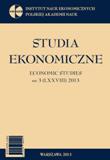Katastrofy i chaos w wyjaśnianiu złożoności procesów gospodarczych
Catastrophes and Chaos in Explaining the Complexity of Economic Processes
Author(s): Aleksander JakimowiczSubject(s): Economy
Published by: Instytut Nauk Ekonomicznych Polskiej Akademii Nauk
Keywords: edge of chaos; chaotic hysteresis model; trade-off between complexity and instability; duopoly; law of progressing complexity
Summary/Abstract: The aim of this article is to show that the application of nonlinear dynamics methods in explorations of nonlinear mathematical models of markets and economies increases cognitive capabilities of economics. It enables us to identify new states in economic systems, such as chaotic hysteresis or the edge of chaos, which seem to have much broader implications for reality than traditional, stable equilibrium states. The new trend of explorations is called complexity economics. The two most important nonlinear methods applied in economics include the catastrophe theory and the deterministic chaos. A catastrophe means a sudden transition of an explored system to a new state. What needs to be underlined is the speed of changes in the object’s behavior in comparison with the mean change in the past. The catastrophe theory brings together seemingly incongruent ways of phenomena analysis into one integrated notion system: evolutionism and revolutionism, continuity and discontinuity. Applications of catastrophe theory in economics are of large cognitive significance. It is them that initiated the complexity economics. Deterministic chaos is a fundamental form of complexity present in science. This type of behavior, also known as the butterfl y effect, concerns the sensitivity of dynamic systems to initial conditions. The article features two model examples of nonlinear dynamics application in economics: the chaotic hysteresis model and the Cournot-Puu duopoly model. What was noticed in the first one was the trade-off between complexity and instability, whereas the later triggered the formation of the law of progressing complexity. The theory of deterministic chaos and the science of complexity present the questions of explanation and foreseeing in economics in a way that is utterly different from the one proposed by conventional economics. A natural state of economic systems is not an equilibrium, but a certain non-equilibrium state known as the edge of chaos, which is reached by markets and economies in the long run. After reaching the edge of chaos it turns out whether a given system can be deemed a complex adaptive system. One condition for its survival is to have emergent properties.
Journal: Studia Ekonomiczne
- Issue Year: 2013
- Issue No: 3
- Page Range: 359-385
- Page Count: 27
- Language: Polish

